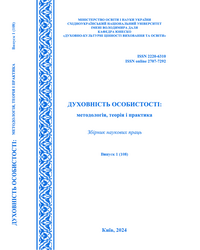TRAINING PHILOLOGY SPECIALISTS ON A BILINGUAL BASIS
DOI:
https://doi.org/10.33216/2220-6310/2024-109-2-132-139Keywords:
bilingual education, bilingualism, bilingual environment, teaching methodsAbstract
The relevance of the issue is driven by the globalization of education and increasing intercultural interaction, thus the topic of bilingualism is gaining greater significance for the pedagogical community. The transformation of the pedagogical understanding of the concept of bilingualism becomes necessary for effective teaching and development of students' language competencies.
This article is dedicated to analyzing the evolution of pedagogical understanding and utilization of the concept of bilingualism. The research aims to uncover transformations in the interpretation and application of the concept of bilingualism in the context of modern education.
The article examines the process of transformation of the pedagogical content of the idea of bilingualism within the educational system of Ukraine. It analyzes various aspects of this transformation, including teaching methods, changes in curricula, and approaches to language policy. The article highlights the importance of bilingual education for the development of language and cultural identity among Ukrainian youth and the challenges it faces in implementation.
Prospects for further research involve expanding the context by analyzing other countries where bilingual education is also implemented for comparative analysis. Empirical research, such as surveys of students, teachers, and parents, can help elucidate their preferences and attitudes toward bilingual education. It is also important to analyze the results of implementing bilingual education, such as students' academic achievements and their language competencies. Developing teacher training programs for implementing bilingual education is also a necessary aspect of research. Additionally, studying the impact of bilingual education on the social and cultural integration of linguistic minorities and majorities can reveal changes in language perception, identity, and interethnic relations. All these aspects contribute to a deeper understanding of the effectiveness and impact of bilingual education both in Ukraine and in other countries.

